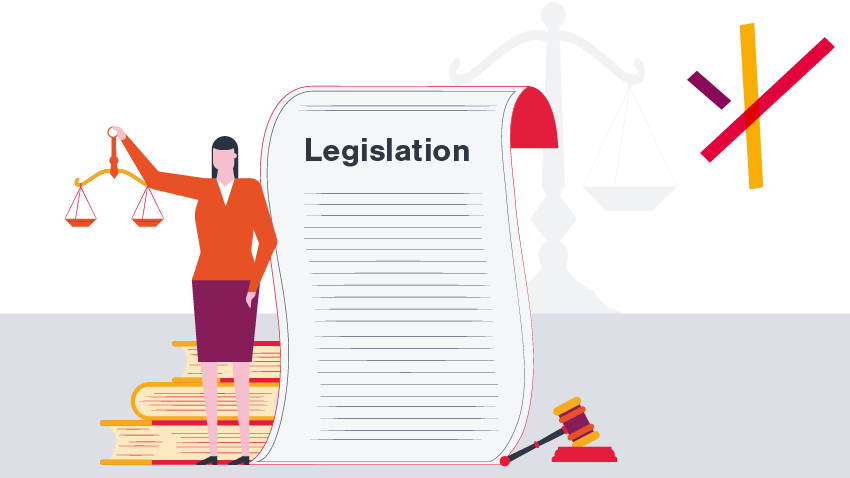How does legislation affect payroll proficiency?
Compliance with tax and employment legislation is probably on top of every HR team’s priority list. The reason is simple: you need to make sure that you pay 100% of your employees, 100% accurately, 100% of the time. Failure to do so can result in heavy fines, correctional costs and a damaged employer brand. The tricky part is that legislation changes all the time and differs from country to country, and even from region to region. Get to know the ins and outs with us.

Scores by country

Legislation complicates payroll from Spain to Sweden
Of all 6 payroll proficiency drivers, legislation is the one that impairs European companies the most in their efforts to deliver a flawless payroll. Only Norway and Poland surpass the 65-point mark. A common difficulty, for example, is the pronounced pro-employee context in countries such as Belgium and France, with numerous collective bargaining agreements on national, regional, industry, company and even plant level. This overly complex regulatory environment has prompted many HR teams to call on payroll partners for help – a tactic that bears fruit.
Claudine Weyn, Director Knowledge Center International at SD Worx
Legislation: top 3 countries
Ranked from most proficient to least proficient
 Norway
Norway
National labour legislation is very stable. That’s why Norway is one of the only countries in Europe where a majority of companies don’t see ‘the speed of changes’ as a top 5 legal complexity. Moreover, every new rule or regulation is announced well in advance and follows a strict plan before publication. This generally gives HR teams time enough to adapt – a process that is facilitated by the government. They often provide detailed guidelines as to how to interpret new legislation and they’re easy to get in touch with in case of questions.
On the flip side, the number of exceptions and special arrangements (regional, per sector, etc.) remains a thorn in the side of many Norwegian companies. It’s considered the number-one legal complexity.
 Poland
Poland
Because Polish labour legislation has always been straightforward, Poland is the only country in Europe where over half of the companies state that legislation is actually making payroll easier. That said, 2022 added a bit of complexity to the world of payroll professionals. In January, the government launched the so-called Polish Deal – a tax revolution. But 6 months later, the poorly conceived new system already led to a tax counter-revolution under the name Polish Deal 2.0. To make matters even more complicated, 2023 will probably start with a Polish Deal 3.0. It’ll be key for payroll professionals to keep up with the various tax reforms.
This explains why Polish companies place ‘the tax system’ and ‘the speed of changes’ in their top 3 of legislative complexities; the other one being ‘the social security system’.
 Spain
Spain
Although Spanish legislation isn’t as complex as in neighbouring France, there are some particularities to take into account. For example, Spain is one of the first EU countries that has made it mandatory to record employee working hours. That’s key to understanding why time and attendance are considered among the top administrative complexities in Spain. And did you know that Spain counts hundreds of collective labour agreements? These are normally issued at state level, but can differ significantly between regions and provinces.
Another particularity to point out is the recent introduction of stricter contracting regulations to reduce the use of uncertain temporary work. Employees are increasingly being protected on different fronts.
Legislation: bottom 3 countries
Ranked from most proficient to least proficient
 Switzerland
Switzerland
Typical for Switzerland is that HR teams have to deal with a variety of legislative bodies and authorities to manage their payroll. To illustrate, taxes are levied at the federal, cantonal and municipal levels, each with their own rates, administration and reporting. That’s also why nearly 20% of Swiss companies consider declarations, reports and communication to authorities a major administrative hassle. And if you only asked SMEs with up to 50 employees, the number is even higher. The smaller the company, the heavier this administrative burden.
As opposed to France and Belgium, the complex legislative reality doesn’t lead to massive payroll outsourcing. A whopping 41% of Swiss companies keeps its payroll entirely in-house.
 Belgium
Belgium
Don’t be fooled by the size of Belgium. The country has no less than 6 governments, each with their own responsibilities and powers. The common thread: although they all announce rules and regulations well in advance, getting the specifics across on time seems somewhat trickier. Take the federal Labour Deal, which was launched in 2022 to lift the overall employment rate by 2030. One of the main novelties is the introduction of a 4-day workweek, but after a full year of official statements, it's still not clear for many HR teams what the exact impact is on holiday entitlement, meal vouchers, sick leave, etc.
The consequence? A vast majority of companies turn to payroll partners for guaranteed legal compliance. It allows HR teams to focus on activities with more added value.
 France
France
Navigating France’s ever-growing Code du Travail is no walk in the park. Not for international companies, but also not for French companies: nearly half of them say that the legislative context is complicating payroll a great deal. Mainly large companies (over 1,000 employees) seem to get lost in the legal maze. And what is it that French companies particularly struggle with? According to our 2023 Payroll Proficiency Index, the 3 main obstacles are the speed of legal changes, the minimum wage rules, and the variety of collective bargaining agreements.
In short, it doesn’t come as a surprise that French companies wouldn’t mind handing over their entire payroll to a partner. Over 44% feel (very) positive about full payroll outsourcing.